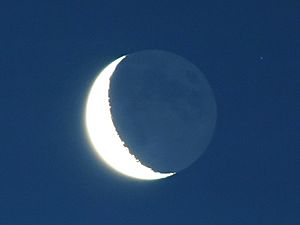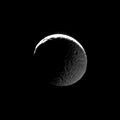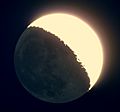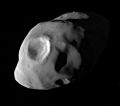Planetshine facts for kids
Have you ever looked at the Moon when it's just a tiny sliver, but you can still faintly see the whole circle? That dim glow on the dark part of the Moon is called Earthshine. It's a special kind of planetshine.
Planetshine happens when sunlight bounces off a planet and then lights up the dark side of one of its moons. It's like the planet acts as a giant mirror in space!
Contents
What is Planetshine?
Planetshine is a cool space trick. It's when light from the Sun hits a planet, reflects off it, and then travels to one of the planet's moons. This reflected light then makes the dark side of the moon glow faintly.
The most famous example of planetshine is Earthshine. This is when light from our Earth lights up the Moon.
Earthshine: Our Moon's Glow
Earthshine is what we see when the Moon is a thin crescent. The part of the Moon that isn't directly lit by the Sun still has a faint glow. This glow comes from sunlight reflecting off Earth's clouds and oceans. That light then travels to the Moon and makes its dark side visible to us.
Think of it like this: If you were standing on the Moon, Earth would look like a very bright, huge full moon in the sky. That bright Earth would be shining light onto the Moon's surface.
Why is it called "Ashen Light"?
Sometimes, Earthshine is also called "the ashen light" or "the old Moon in the new Moon's arms." This name describes how the faint, ghostly glow of the full Moon seems to be held within the bright crescent.
Who discovered Earthshine?
People have noticed Earthshine for a very long time. The famous artist and inventor Leonardo da Vinci was one of the first to explain it correctly. Around 1506 to 1510, he wrote in his notes that the Moon's faint glow was caused by light reflecting off Earth's oceans.
Other Kinds of Planetshine
Planetshine doesn't just happen with Earth and its Moon. It can happen with other planets and their moons too!
Saturnshine and Ringshine
For example, Saturn has many moons. Sunlight can reflect off Saturn and light up its moons, which is called Saturnshine.
Even more amazing, sunlight can reflect off Saturn's bright rings and light up its moons. This is called Ringshine. Scientists have seen ringshine on Saturn's moons like Pandora and Mimas. The Cassini spacecraft even captured images of ringshine when it orbited Saturn.
Why is Planetshine Important?
Scientists study planetshine to learn more about planets. By looking at how much light a planet reflects, they can learn about its clouds, atmosphere, and surface. This helps them understand what these distant worlds are made of and what they are like.
It's also a beautiful reminder that our solar system is full of amazing light shows!
Images for kids
-
Crescent Moon and earthshine over the ESO's Paranal Observatory.
See also
 In Spanish: Luz cenicienta para niños
In Spanish: Luz cenicienta para niños











